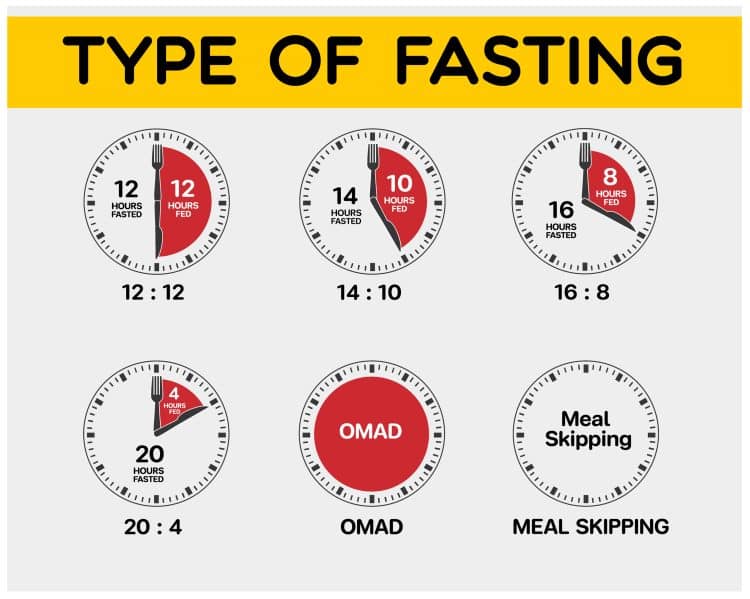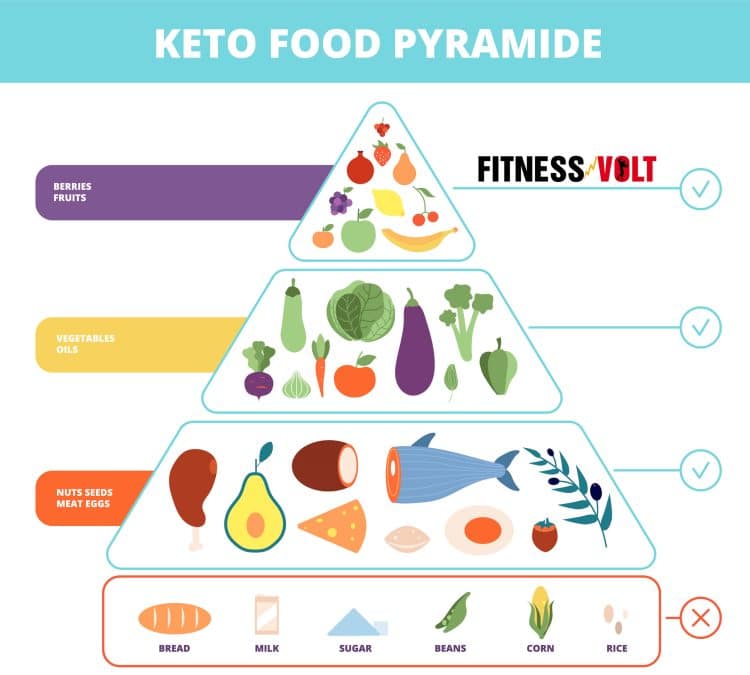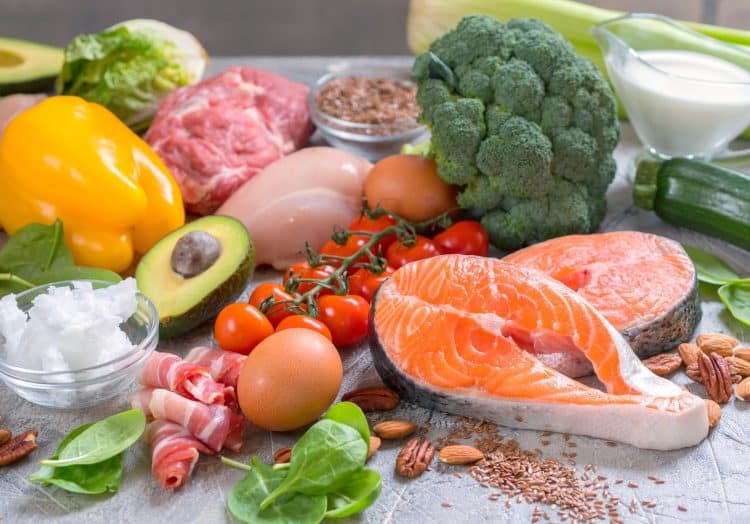Obesity is one of the most widespread health issues in the modern age. What makes it so serious is that it is often the root cause of serious health problems like type 2 diabetes, strokes, cardiovascular issues, etc. The comfortable and sedentary modern age lifestyle, coupled with an unbalanced fast food-oriented diet, accelerate this problem. [1]
However, it is not all doom and gloom for us, as healthcare professionals and doctors have proposed various solutions, such as fasting, calorie restriction, and keto dieting to combat these growing concerns. Intermittent fasting and keto diets have been the rage recently due to their evidence-based methodologies and the results they provide in a short period.
Now, some people think that intermittent fasting (IF) and ketogenic diets can be combined to get quicker and better results. Confused? Don’t worry. We have your back.
Further in this article, we will provide all the information you need on combining ketogenic and intermittent fasting diets so that you are better informed about this unique approach and can decide if you should try it yourself.
- What is Intermittent Fasting?
- Most Popular Intermittent Fasting Plan
- Benefits of Intermittent Fasting
- What is a Keto Diet?
- Most Popular Keto Diet
- Benefits of a Keto Diet
- Can a Person on an Intermittent Fasting Diet Follow a Keto Diet?
- Benefits of Keto Intermittent Fasting
- Keto Intermittent Fasting Plan
- How To Make Keto Intermittent Fasting Easier?
- Foods Allowed During Keto Intermittent Fasting
- Foods Prohibited While Keto Intermittent Fasting
- Who Should Follow Keto Intermittent Fasting?
- Who Should Avoid Keto Intermittent Fasting?
- Frequently Asked Questions
- Final Thoughts
- References
What is Intermittent Fasting?
Most people confuse intermittent fasting with calorie-restriction diets, but intermittent fasting has nothing to do with calorie restriction. Instead, it is a time-restricted diet where the person following the IF plan eats within a specific time window and fasts for the rest of the day.

It is essential to point out that intermittent fasting is not a dry fast, meaning you can drink water and zero-calorie drinks like unsweetened black coffee and tea, during the fasting window of the diet.
When we eat food, our body processes, digests, and stores it in the form of glycogen to utilize later as a source of energy. The excess glycogen is then converted to fat, causing weight gain.
During intermittent fasting, the body is deprived of the energy required for proper functioning. It is then forced to tap into the stored fat reserves, which are broken down for sustenance. This process of breaking down body fat reserves helps us lose weight. [2]
Most Popular Intermittent Fasting Plan
In recent times, intermittent fasting plans have captured the fancy of people who are health-conscious or are looking for a way to lose body fat quickly and healthily. This popularity has given rise to numerous intermittent fasting plans.
Some intermittent fasting plans require up to 10 hours of fasting, whereas some advanced IF plans can last a couple of days. Among these, the most popular, practical, and effective intermittent fasting plan is the 16:8 plan. In this type of intermittent fast, participants must eat in an eight-hour window and fast for the remaining 16 hours of the day.
16:8 intermittent fasting plan is practical for newcomers and veterans as people usually sleep for around eight hours. So, effectively, only eight hours are to be spent fasting while awake.
Benefits of Intermittent Fasting

Intermittent fasting plans can be extremely healthy. They have many health-related benefits, some of which are as follows:
1. Helps Lose Weight
During the fasting phase of an intermittent fast, the body is constantly in a state of ketosis since it is deprived of food. It is forced to break down fat from the stored fat reserves, helping lose weight. [3]
2. Keeps Blood Sugar Levels in Control
People with type 2 diabetes can benefit from intermittent fasting. The biggest problems associated with type 2 diabetes are constant high blood sugar and low insulin resistance. With intermittent fasting, the body experiences a metabolic shift where it starts making energy by breaking down stored fat. Studies suggest that ketosis often translates to lower blood glucose levels and a general increase in insulin sensitivity. [4]
3. Improves Brain Function
Some studies suggest that intermittent fasting can help us boost brain function and health. It is because intermittent fasting has been found to stimulate cell autophagy, which means the body replaces the old, weak brain cells with healthy neurons. Also, IF has been found to reduce inflammation, which helps boost brain function. [5]
4. Raises Productivity
Intermittent fasting improves productivity. We have all had situations where we feel lethargic after a hearty meal. It is because the body has to prioritize the process of digestion. Hence, it sends certain signals to the brain, making us sleepy and languid so that the body can use all its energy to digest food. Therefore, it is normal to feel focused while fasting as the body doesn’t have to worry much about digestion.
What is a Keto Diet?
A keto diet, similar to intermittent fasting, has gained popularity in the past few years because it can be a quick way to lose fat and get in shape. Simply put, keto diets aim to reduce a person’s carbohydrate intake to a bare minimum and increase their fat intake significantly. A moderate amount of protein is also allowed since they are essential for muscle gain and repair.
By substantially increasing a person’s fat intake and simultaneously decreasing carbs, the keto diet forces the body to undergo a metabolic change where the glucose produced by carbs is replaced by fat and fatty acids as the body’s primary energy source. A person following the keto diet is in a constant state of ketosis, where their body becomes incredibly efficient at burning fat for energy. Ketosis also turns fat into ketones in the liver, which can be used as an alternate energy source.
People who follow a keto diet tend to utilize fat as the primary energy source, so fat buildup is not possible, leading to weight loss.

Most Popular Keto Diet
Keto diets significantly change our eating habits since it is fairly complex for the average person to eliminate carbohydrates from their diet. Many dietitians and health professionals recommend a keto diet consisting of 5% carbs, 70% fats, and 25% protein.
Remember, you should always consult a qualified dietitian before starting a new diet program.
Benefits of a Keto Diet
Some of the benefits of the keto diet are as follows:
1. Burns Fat
Fat loss is the primary benefit of following a keto diet, which is achieved in a unique way. Keto diets restrict a person’s carbohydrate intake, which is the traditional source of energy for the body. It triggers the body to look for an alternative source of energy, which in the case of a keto diet, is fat.
A person following a keto diet actively burns fat for energy, meaning no excess fat is stored in the body. [6]
2. Lowers Blood Sugar Levels
The blood sugar levels of a person spike when they consume carbohydrates or glucose-related substances, but a person on a keto diet does not consume a lot of carbohydrates, meaning the blood sugar levels stay in check. Also, glycogen, responsible for blood sugar spikes, is replaced by ketones in a keto diet. [7]
Can a Person on an Intermittent Fasting Diet Follow a Keto Diet?
To answer the question, yes, people on an intermittent fasting program can also follow a keto diet. The combination of intermittent fasting and a keto diet can be great for burning body fat.
To achieve this, an individual has to ensure that they follow a ketogenic diet with minimum carbs, maximum fat, and moderate protein during the eating phase of an intermittent fasting plan and fast for the rest of the day.
Benefits of Keto Intermittent Fasting
The benefits of a keto intermittent fasting diet are as follows:
1. Faster Weight Loss Results
Following a keto intermittent fasting plan can significantly speed up your weight loss process, provided the calories consumed do not exceed the daily requirement. During the fasting hours, your body will be in ketosis due to the intermittent fasting plan, and during the eating window, the body will break down the fat, leading to more ketosis.
2. Decreases Appetite
Studies suggest that ketogenic diets help suppress appetite due to the change in the appetite-regulating hormones leptin and ghrelin. Additionally, consuming large amounts of food in the eight-hour eating window of an intermittent fast is difficult. [8]
3. Decreases Caloric Gain
Consuming three meals in the stipulated eight-hour window is difficult during intermittent fasting. So people are usually in a caloric deficit while following an intermittent fasting diet, which contributes to weight loss.
Keto Intermittent Fasting Plan
Here are some suggestions for intermittent fasting routines and keto-based meal plans:
Intermittent Fasting Routine Suggestions For 16:8 Hour Plan
| Eating Window | Fasting Window |
| 12 pm to 8 pm | 8 pm to 12 pm |
| 10 am to 6 pm | 5 pm to 9 am |
| 2 pm to 10 pm | 10 pm to 2 pm |
Keto Intermittent Fasting Meal Plan

Here is a sample keto diet plan:
DAY 1
- First Meal: Keto oats with full-fat milk and yogurt
- Second Meal: Chicken Caesar salad without the croutons
- Third Meal: Steak with roasted broccoli
DAY 2
- First Meal: Eggs with a side of avocado
- Second Meal: Chicken salad with full-fat mayo and greens
- Third Meal: Bison Steak
DAY 3
- First Meal: Chia seed pudding made with coconut milk and nuts
- Second Meal: Turkey breast with salad greens
- Third Meal: Meatballs cooked with tomato sauce
DAY 4
- First Meal: Egg Frittata
- Second Meal: Cobb Egg Salad
- Third Meal: Chicken Parm
DAY 5
- First Meal: Omelettes stuffed with peppers
- Second Meal: Tuna salad
- Third Meal: Keto tacos
DAY 6
- First Meal: Jalapeno Popper Egg Cups
- Second Meal: Cheesesteak Lettuce Wraps
- Third Meal: Burger Bowls without the buns
DAY 7
- First Meal: Eggs cooked with spinach
- Second Meal: Brussel Sprout Salad with eggs
- Third Meal: Cheeseburger without the buns
How To Make Keto Intermittent Fasting Easier?
Following a keto intermittent fasting diet can be overwhelming due to the shift in dietary requirements. For beginners, this can be a complete shock to their system. Here are some tips to help incorporate keto intermittent fasting plans into your daily lifestyle:
1. Start with Intermittent Fasting
For people who are complete novices to fasting and keto diets, it is better to tread slowly. One of the best things you can do is to start with the beginner-friendly 16:8 intermittent fasting routine.
2. Plan Out a Keto Diet
One of the biggest drawbacks to a keto diet is its meal plans. Since most food items contain carbohydrates, you should plan your food dishes and meal prep before beginning a keto diet.

3. Slowly Introduce Keto Into Your IF Eating Window
Once you have decided on starting a keto diet, it is better to gradually introduce keto meals into your IF eating window, meaning that you should slowly increase your fat intake and decrease your carbohydrate intake. Since your body has been used to carbohydrates for a long time, it tends to crave carbohydrate-rich foods, making your initial fasting period difficult.
4. Completely Replace Your Diet With Keto
Once your body has adjusted to the initial keto meals and you are feeling comfortable with the keto diet and intermittent fasting, you can go ahead and switch to a keto diet.
5. Keep Track of Your Carbohydrate Intake
Following this diet can cause carbohydrate cravings. It is essential to resist the temptation and keep a close watch on your daily carbohydrate intake, which should be under the total allowed amount.
Foods Allowed During Keto Intermittent Fasting
Some food items that can be easily incorporated into a keto intermittent fasting plan include:
- Nuts: All kinds of nuts, especially the ones with high-fat content, like pecans, macadamias, walnuts, etc., are a great addition to salads.
- High-Fat Fish: Oily fish like salmon, mackerel, and sardines can significantly add to keto diets.
- Eggs: Eggs are a superfood for people following a keto diet. They are budget-friendly, delicious, and full of fats and proteins.
- Oils: Well, this is a no-brainer. Good quality oil is a must for keto diets.
- Unprocessed Meat: When it comes to keto diets, meat products like steak are a great option since they have very few carbohydrates and are packed with fats and proteins.
- Full-Fat Dairy Products: Cheese, butter, and full-fat whole milk are great for keto diets.
- Green Leafy Vegetables: Vegetables must be included in a keto diet since they contain fiber, which is necessary for proper bowel movements.
Foods Prohibited While Keto Intermittent Fasting
Here are some foods that should be avoided while on a keto intermittent fasting plan as they might hinder the ketosis process:
- Root Vegetables: Tubers like potatoes, carrots, and beetroot are filled with carbohydrates and must be avoided while on a keto diet.
- Sugars: All forms of sugar and sugar products must be avoided while on a keto diet, as sugar will spike blood sugar levels and prevent ketosis.
- Legumes: Although they are rich in protein, they also contain a high amount of carbohydrates, so they must be avoided.
- Grains and grain products: Similar to legumes, grains like rice, wheat, and corn are starchy and contain a high percentage of carbohydrates. People on a keto intermittent fasting diet must stay away from such food grains and grain products like bread, pasta, cereal, etc.
Who Should Follow Keto Intermittent Fasting?
Keto intermittent fasting is a wonderful way to shed those extra pounds quickly. People who are overweight but otherwise healthy with no underlying health issues can take up some form of keto intermittent fasting to lose weight.
It is important to note that following a low-carb diet for an extended period is not recommended, even for healthy people. Following a keto diet for 2–3 months is fine, which will help you lose weight, whereas intermittent fasting plans can be maintained for extended periods.
Who Should Avoid Keto Intermittent Fasting?
Although keto intermittent fasting plans are fairly safe, here is a list of people who should avoid this diet:
- People with underlying health concerns, like uncontrolled diabetes and gastrointestinal problems.
- Those who are on some medication for specific health issues like blood pressure, etc.
- Folks who suffer from eating disorders.
- People over the age of 50-55 should stay away from this diet.
- Teenagers under 18 should not follow keto diets as they are in their formative years and require a balanced diet for optimal growth.
Frequently Asked Questions
Are there any side effects of keto intermittent fasting?
Both keto and intermittent fasting plans are fairly safe for most people but can have side effects like constipation, headache, and nausea. Beginners are more prone to these side effects. It is always better to consult a healthcare professional before beginning these diet plans.
How long should I fast while following this plan?
Following a 16:8 IF program is recommended while following a keto intermittent fasting plan to get the best results.
Can I drink liquids during keto intermittent fasting?
Yes, water and other zero-calorie drinks like unsweetened tea and coffee are allowed during the fasting phase.
Can I take supplements while keto intermittent fasting?
While supplements are not allowed during the fasting window, people can take certain supplements during the eating window, provided they do not mess up the macros for the keto diet.
Can I work out while on keto intermittent fasting?
Yes, working out on a keto intermittent fasting program is generally allowed since it will speed up weight loss.
How to know if keto intermittent fasting is right for me?
It entirely depends on the individual and their specific health conditions. You can consult a dietitian or a healthcare professional to help you better understand if keto intermittent fasting is right for you.
Can I enter ketosis if I eat carbs while intermittent fasting?
Yes, some form of ketosis can be achieved while eating carbs on an intermittent fasting routine. However, the ketosis rate on this diet will be significantly lower than a combined keto intermittent fasting.
How much weight can you lose on keto and intermittent fasting in a week?
It is tough to predict how much weight can be lost in a week on keto intermittent fasting since weight loss depends on a host of different factors, which vary from person to person.
Find out more about fasting:
- 11 Best Intermittent Fasting Books in 2023 (Review and Ranked)
- 7 Day Water Fast: Your Journey to Rejuvenation and Wellness
- 6 Intermittent Fasting Juice Recipes: Sip Your Way to Success with These Tasty Recipes!
- Eat Stop Eat Intermittent Fasting Decoded: Master Your Metabolism & Lose Weight
- Intermittent Fasting for Weight Loss in Men — The Ultimate Guide
- Fat Loss vs. Weight Loss — Explained!
- Fruit Fasting: The Sweet Path to Wellness
- Foods To Avoid While Intermittent Fasting
- Does Cinnamon Break a Fast? Separating Fact from Fiction
- Does Honey Break Your Fast? — Unveiling the Truth
Final Thoughts
Keto intermittent fasting can be a quick way to lose excess body fat. Despite the health benefits of this diet, experts believe you should ideally follow a carb-restricted diet only for a short period. It is best to seek medical advice and conduct a proper self-evaluation before beginning a keto intermittent fasting diet program.
For keto intermittent fasting to work well, having healthy food is essential. A keto diet and intermittent fasting can be combined to increase the impact and hasten the fat loss outcomes. However, sticking to this diet routine will test your grit and determination.
References
- Kyrou, Ioannis, et al. “Clinical Problems Caused by Obesity – Endotext – NCBI Bookshelf.” Clinical Problems Caused by Obesity – Endotext – NCBI Bookshelf, 11 Jan. 2018, www.ncbi.nlm.nih.gov/books/NBK278973.
- Mattson, Mark P., et al. “Impact of Intermittent Fasting on Health and Disease Processes – PMC.” PubMed Central (PMC), 31 Oct. 2016, www.ncbi.nlm.nih.gov/pmc/articles/PMC5411330.
- “Diet Review: Intermittent Fasting for Weight Loss | the Nutrition Source | Harvard T.H. Chan School of Public Health.” The Nutrition Source, 16 Jan. 2018,
- Furmli, Suleiman, et al. “Case Report: Therapeutic Use of Intermittent Fasting for People With Type 2 Diabetes as an Alternative to Insulin.” PubMed Central (PMC), 9 Oct. 2018, www.ncbi.nlm.nih.gov/pmc/articles/PMC6194375.
- Gudden, Jip, et al. “The Effects of Intermittent Fasting on Brain and Cognitive Function – PMC.” PubMed Central (PMC), 10 Sept. 2021.
- Dashti, Hussein M., et al. “Long-term Effects of a Ketogenic Diet in Obese Patients – PMC.” PubMed Central (PMC), www.ncbi.nlm.nih.gov/pmc/articles/PMC2716748. Accessed 22 Oct. 2022.
- Paoli, A., et al. “Beyond Weight Loss: A Review of the Therapeutic Uses of Very-low-carbohydrate (Ketogenic) Diets – European Journal of Clinical Nutrition.” Nature, 26 June 2013, www.nature.com/articles/ejcn2013116.
- “Do Ketogenic Diets Really Suppress Appetite? A Systematic Review and Meta-analysis – PubMed.” PubMed, 1 Jan. 2015.


